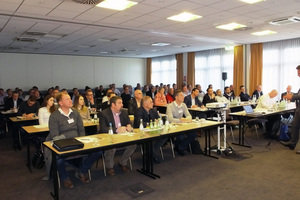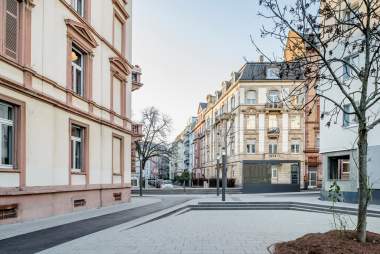Symposium on “Concrete paving block construction”
For as many as three years, the German Concrete Association for Roads, Landscaping, and Garden Construction (Betonverband Straße Landschaft Garten e.V.; SLG) has organized symposiums on current developments in and aspects of concrete paving block and slab construction for the applications engineers of its member companies. Dipl.-Ing. Dietmar Ulonska, director of the Association, welcomed around 80 participants to the third symposium on “Concrete paving block construction” which was held at the end of November 2017.
The contributions covered a wide range of topics from current legal issues via amendments in the rules and regulations and special construction methods all the way to the frequently occurring defects on concrete paving blocks, their causes and ways to prevent them. Attorney Michael Schorn from law firm Busse und Miessen based in Bonn opened the series of presentations with a lecture on the “New construction contracts law – what do construction material suppliers need to consider?”
Concrete slab pavements on top of buildings
This was immediately followed by the lecture given by Dr. Karl-Uwe Voß: the director of the Materials Testing and Research Institute (Materialprüfungs- und Versuchsanstalt; MPVA) based in Neuwied reported on the interim results of the research project “Soiling of concrete block pavements caused by joint materials”. In a second lecture given later in the day, Dr. Voß additionally addressed the issue of chipping on the edges of concrete products and its causes.
Dipl.-Ing. Bernd W. Krupka, landscape architect, urban designer and expert based in Bad Pyrmont, gave a lecture on the specific structural-engineering requirements to be observed when designing and implementing concrete block and slab pavements on top of buildings. The frequently low pavement thicknesses, usual lack of slope, low connecting heights and large number of fixtures on top of most buildings result in specific requirements not only on protecting the waterproofing of the structure but also on the compactability, structural capacity and water impermeability of the different pavement layers.
The series of presentations concluded with a lecture given by Dipl.-Ing. Dietmar Ulonska on the amendments in the ZTV Pflaster (Zusätzliche Technische Vertragsbedingungen zur Herstellung von Pflasterdecken im Straßenbau; Supplementary Technical Conditions of Contract for Installing Paving Blocks in Road Construction) expected to be published in the coming year. On a final note, the director of the German Concrete Association for Roads, Landscaping, and Garden Construction critically commented on some imprecise statements and formulations in the revised draft of the ATV DIN 18318 (Allgemeine Technische Vertragsbedingungen für Bauleistungen - Verkehrswegebauarbeiten - Pflasterdecken und Plattenbeläge in ungebundener Ausführung, Einfassungen; General Technical Conditions of Contract for Construction Services - Road Construction - Dry-jointed Sett and Slab Pavements, and Surrounds). In his opinion, these are a considerable source of potential controversy if the identified sources of error are not eliminated prior to publication.




